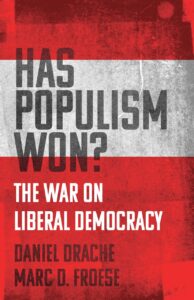 Something odd happens when the elites discuss the crisis of western democracy. No one wants to fault the public, at least not in so many words. That would be Marie Antoinette-ish, the FT’s Janan Ganesh writes:
Something odd happens when the elites discuss the crisis of western democracy. No one wants to fault the public, at least not in so many words. That would be Marie Antoinette-ish, the FT’s Janan Ganesh writes:
No one can “Dissolve the people / And elect another”, any more than in Bertolt Brecht’s time. If only a poet would come up with some verse for the opposite mistake, though. In skirting the demand side of politics — the public — the elites have lost themselves in irrelevancies. … In going on about [Twitter], the media will be accused of self-obsession, but I fear something yet worse is going on.
It is more soothing to think that what ails democracy is on screen, and not out there, he notes.
“The center has been losing ground, and it will not hold,” says political scientist Pippa Norris. A “silent revolution in cultural values” has occurred across advanced democracies in recent decades, which helps explain why the best predictor of support for populist parties is the generation people were born into, adds Norris, co-author with Ronald Inglehart of “Cultural Backlash: Trump, Brexit and Authoritarian Populism.”
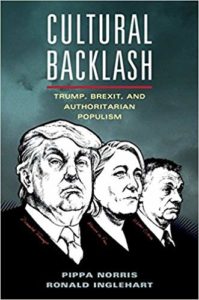 The book gives the best explanation of the far right’s rise, says Ezra Klein, who discusses with Norris the “transgressive aesthetic” of populist leaders, how demographic and cultural “tipping points” have produced conservative backlashes across the globe, the difference between “demand-side” and “supply-side” theories of populist uprising, the role that economic anxiety and insecurity play in fueling right-wing backlashes, why delivering economic benefits might not be enough for mainstream leaders to stave off populist challenges and more. RTWT
The book gives the best explanation of the far right’s rise, says Ezra Klein, who discusses with Norris the “transgressive aesthetic” of populist leaders, how demographic and cultural “tipping points” have produced conservative backlashes across the globe, the difference between “demand-side” and “supply-side” theories of populist uprising, the role that economic anxiety and insecurity play in fueling right-wing backlashes, why delivering economic benefits might not be enough for mainstream leaders to stave off populist challenges and more. RTWT
Democracy itself is not just an unruly contest for power, but also the site of an ongoing debate about what democracy is or should be, notes Michael Ignatieff. Illiberal, populist visions have long defined democracy as majority rule backing up a strong leader, while liberal definitions have long insisted that majority rule must be balanced by minority rights and countermajoritarian institutions, he writes for the NED’s Journal of Democracy.
Strongman leaders cement their hold on power through a cult of personality, contempt for the rule of law, and populist attacks on the elite establishment and the liberal consensus of the 1990s, Princeton’s G. John Ikenberry writes for Foreign Affairs.
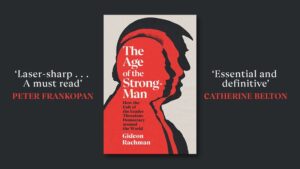 In his book, The Age of the Strongman, the FT’s Gideon Rachman argues that the ethos is deeply rooted in global economic and technological changes and in the failures of and disillusionment with liberal democracy. But strongmen have their own weaknesses: personalistic rule cannot last forever, and dictators are rarely able to deliver what they promise.
In his book, The Age of the Strongman, the FT’s Gideon Rachman argues that the ethos is deeply rooted in global economic and technological changes and in the failures of and disillusionment with liberal democracy. But strongmen have their own weaknesses: personalistic rule cannot last forever, and dictators are rarely able to deliver what they promise.
Earlier this year, when Russia invaded Ukraine, experts once more thought the crisis would torpedo the populist insurgency. Certainly, conservatives have turned against the Putin regime in record numbers. But pandemic, war, inflation, and an energy crisis has not destroyed populism in any country where it has already gained a foothold, according to Daniel Drache and Marc D. Froese, co-authors of Has Populism Won? The War On Liberal Democracy.
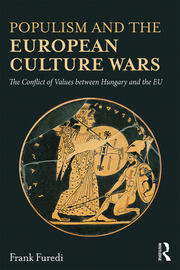 But Hungary’s emergence as the bad boy of Europe has little to do with this nation’s supposed fascination with authoritarianism, argues Frank Furedi, the executive director of MCC Brussels and emeritus professor at the University of Kent. As I argue in my book “Populism and the European Culture Wars,” Orbán’s pathologization is motivated by hostility toward the values promoted by his government, he writes for POLITICO:
But Hungary’s emergence as the bad boy of Europe has little to do with this nation’s supposed fascination with authoritarianism, argues Frank Furedi, the executive director of MCC Brussels and emeritus professor at the University of Kent. As I argue in my book “Populism and the European Culture Wars,” Orbán’s pathologization is motivated by hostility toward the values promoted by his government, he writes for POLITICO:
Unlike many others in Europe, Hungary’s government self-consciously advocates national sovereignty. It isn’t inhibited about upholding the traditions and values of its people — including Christianity — and it is unambiguously hostile toward an outlook that prefers to dismiss the legacy of Europe’s past. Hungary is hated by the West’s culture warriors for the simple reason that it dares to question their post-traditionalist, identity-politics-fueled world view.
There is clearly a global network, or a kind of global front, of what I would call ultranationalist, authoritarian-leaning politicians, analyst Matt Duss tells the New Yorker’s Isaac Chotiner. We know who they are: Putin, Orbán, Bolsonaro. They work very closely with oligarchs within their own countries, and with oligarchs who work across borders.
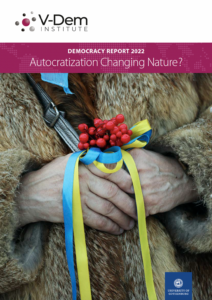 The Transnational Law Institute (TLI) is launching a Consortium on Global Resistance to Authoritarian Diffusion (GRAD Consortium) to study authoritarian developments and explore domestic and international resistance to autocratization. The project asks:
The Transnational Law Institute (TLI) is launching a Consortium on Global Resistance to Authoritarian Diffusion (GRAD Consortium) to study authoritarian developments and explore domestic and international resistance to autocratization. The project asks:
- What are the primary forms of autocratisation taking place today?
- What are the economic, social and political drivers of autocratisation?
- How are autocratic norms and practices diffused around the world?
- What forms of resistance have emerged within autocratising countries?
- What role have the legal system and lawyers played in the resistance?
- What are the sources of transnational resistance to autocratisation, how are they linked to domestic groups, and how effective have they been?
The GRAD Consortium will be supported by the initial GRAD Partners: the TLI, based at The Dickson Poon School of Law, King’s College London; the Fundação Getúlio Vargas Law School in Sao Paulo (FGVLAW-SP), the University of Wisconsin Law School (UW), and the Project on Autocratic Legalism (PAL).
“Democracy was and still is at risk” – watch our Co-Director @octavio_ferraz discuss last night’s crucial elections in #Brazil on @France24_en
https://t.co/UMq3aVYImG
— King’s Transnational Law Institute (@TLIKings) October 31, 2022








